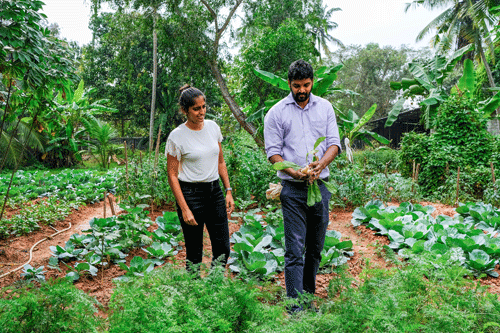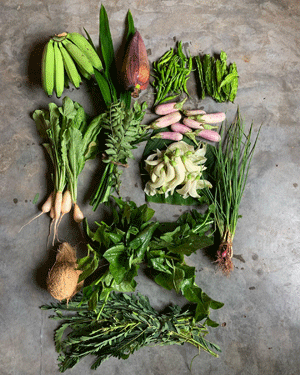A home garden that spread its roots

Medhini and Abishek tending their plot of veggies
When architect Medhini Igoor and her engineer/businessman husband Abishek Devaraj moved to Sri Lanka from India, they started growing their own produce on land they had acquired in Kotugoda, on the outskirts of Colombo. Medhini soon realised that they had an excess of produce, more than what could be used by them or given to family and friends which is when she started looking into organic agriculture.
What started as a home garden four years ago soon grew into a couple of acres and became Us On Earth, a farm that focuses on organic crops, grown without the use of any chemicals or commercial fertilisers.
“We started Us On Earth mainly as an idea to just showcase what we’re doing to more people in the hope that more people get into the idea of organic agriculture. The other reason was to also sell our excess produce,” Medhini says.
The initial stages were all trial and error, she recalls, as they were both beginners to the world of agriculture and relied mainly on a gardener to show them the ropes. Over time, one non-negotiable factor became the non-use of chemicals and commercial fertilisers, with much research going into methods and techniques of agriculture which didn’t require their use.
 A challenge the duo faced early on was convincing their gardeners and farmers that it was possible to grow plants without using agrochemicals.
A challenge the duo faced early on was convincing their gardeners and farmers that it was possible to grow plants without using agrochemicals.
“There was a lot of research that went in while we were doing it so we kind of learned on the job and after we had started the farm. There was a lot of trial and error. We tried a lot of different things and figured out what works for us,” reflects Medhini. She adds that it took a year or two to get settled, find a balance, and come up with a routine.
When it came to preparing the land for growing, they were quite fortunate as the land was not used for cultivation previously and therefore did not need to undergo any regenerative procedures. They eventually learned how to keep the soil balanced and healthy without the use of external inputs when they grew produce, as soil generally tends to be leached of its nutrients by crops. One way they keep this balance is by rotating their crops every 2-3 months. Another is by regularly mixing in compost or manure – a by-product of their hens – and organic fertiliser which replenishes the soil.
The hens were initially added to the farm because of the option of free-range, pasteurised eggs but soon Medhini and Abishek saw the added benefits. “The reason why we also got the hens was because we wanted pasteurised, free-range eggs. That was the main reason but as an afterthought, we realised that getting livestock into the farm was very beneficial for us because the amount of input in terms of manure was drastically reduced because we now use chicken manure and compost.”
In terms of the crops they grow, they stick to low country vegetables such as brinjal, snake gourd, bitter gourd, and cucumber, growing close to 15-20 varieties a year. There are also pre-existing perennial trees that produce local fruits like Rambutan and Starfruit.
Talking about growing one’s own produce, increasingly seen as an urgent need by many people to combat the current food shortages, Medhini says it’s possible for anyone to do so.
She recommends that everyone starts small which is easily done by getting a few pots and one or two varieties of plants, especially if they are new to gardening.
The second tip she gives is to grow something easy. Vegetables like carrots and tomatoes need a lot more care so she recommends avoiding these initially. Local vegetables like brinjal and ladies’ fingers are a good choice as they are sturdier and aren’t frequented by pests.
The bottom line is to find what works for a person.
Thirdly, she recommends making a few changes in the kitchen. Saving seeds and composting are some small changes that can have an impact. She likens it to closing the loop because the compost made goes into the plants that are growing, “It’s a bit of a lifestyle change but little things go a long way.”
Us on Earth is a farm–to–table concept with a focus on organic and sustainable agriculture.
Visit their Facebook page at www.facebook.com/usonearth.lk/
Searching for an ideal partner? Find your soul mate on Hitad.lk, Sri Lanka's favourite marriage proposals page. With Hitad.lk matrimonial advertisements you have access to thousands of ads from potential suitors who are looking for someone just like you.


